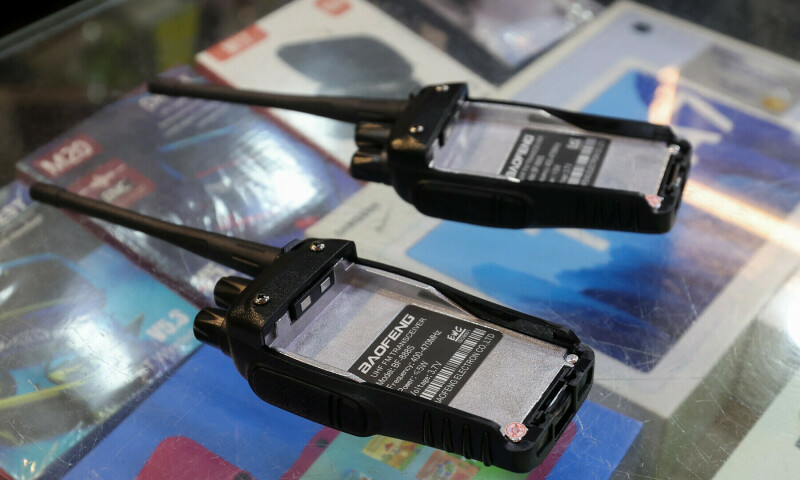An invisible detonator and wafer-thin plastic explosives turned batteries into bombs.
The batteries inside the weaponised pagers that arrived in Lebanon at the start of the year, part of an Israeli plot to decimate Hezbollah, had powerfully deceptive features and an Achilles’ heel.
The agents who built the pagers designed a battery that concealed a small but potent charge of plastic explosive and a novel detonator that was invisible to X-ray, according to a Lebanese source with first-hand knowledge of the pagers and teardown photos of the battery pack seen by Reuters.
To overcome the weakness — the absence of a plausible backstory for the bulky new product — they created fake online stores, pages and posts that could deceive Hezbollah due diligence, a Reuters review of web archives shows.
The stealthy design of the pager bomb and the battery’s carefully constructed cover story, both described here for the first time, shed light on the execution of a years-long operation which has struck unprecedented blows against Israel’s Iran-backed Lebanese foe and pushed the Middle East closer to a regional conflict.
A thin, square sheet with six grams of white pentaerythritol tetranitrate (PETN) plastic explosive was squeezed between two rectangular battery cells, according to the Lebanese source and photos.
The remaining space between the battery cells could not be seen in the photos but was occupied by a strip of highly flammable material that acted as the detonator, the source said.
This three-layer sandwich was inserted in a black plastic sleeve, and encapsulated in a metal casing roughly the size of a matchbox, the photos showed.
The assembly was unusual because it did not rely on a standard miniaturised detonator, typically a metallic cylinder, the source and two bomb experts said.
All three spoke on conditions of anonymity.
Without any metal components, the material used to trigger detonation had an edge: like the plastic explosives, it was not detected by X-ray. Upon receiving the pagers in February, Hezbollah looked for the presence of explosives, two people familiar with the matter said, putting them through airport security scanners to see if they triggered alarms. Nothing suspicious was reported.
The devices were likely set up to generate a spark within the battery pack, enough to light the detonating material and trigger the sheet of PETN to explode, said the two bomb experts, to whom Reuters showed the pager-bomb design.
Since explosives and wrapping took about a third of the volume, the battery pack carried a fraction of the power consistent with its 35-gramme weight, two battery experts said.
“There is a significant amount of unaccounted for mass,” said Paul Christensen, an expert in lithium batteries at Britain’s Newcastle University.
At some point, Hezbollah noticed the battery was draining faster than expected, the Lebanese source said. However, the issue did not appear to raise major security concerns — the group was still handing its members the pagers hours before the attack.
On Sept 17, thousands of pagers simultaneously exploded in the southern suburbs of Beirut and other Hezbollah strongholds, in most cases after the devices beeped, indicating an incoming message.
Among the victims rushed to hospital, many had eye injuries, missing fingers or gaping holes in their abdomens, indicating their proximity to the devices at the time of detonation, Reuters witnesses saw. In total, the pager attack, and a second on the following day that activated weaponised walkie-talkies, killed 39 people and wounded more than 3,400.
Two Western security sources said Israeli intelligence agency Mossad spearheaded the pager and walkie-talkie attacks.
Reuters could not establish where the devices were manufactured. The office of Israel’s Prime Minister Benjamin Netanyahu, which has authority over Mossad, did not respond to a request for comment.
Lebanon’s information ministry and a spokesperson for Hezbollah declined to comment for this article.
Israel has neither denied nor confirmed a role. The day after the attacks, Israeli Defence Minister Yoav Gallant praised Mossad’s “very impressive” results in comments that were widely interpreted in Israel as a tacit acknowledgement of the agency’s participation.
US officials have said they were not informed of the operation in advance.
The weak link
From the outside, the pagers’ power source looked like a standard lithium-ion battery pack used in thousands of consumer electronics goods.
And yet, the battery, labelled LI-BT783, had a problem: Like the pager, it did not exist on the market.
So Israel’s agents created a backstory from scratch.
Hezbollah has serious procurement procedures to check what they buy, a former Israeli intelligence officer, who was not involved in the pager operation, told Reuters.
“You want to make sure that if they look, they find something,” the former spy said, requesting not to be named. “Not finding anything is not good.”
Creating backstories, or legends, for undercover agents has long been a core skill of spy agencies. What made the pager plot unusual is that those skills appear to have been applied to ubiquitous consumer electronics products.
For the pagers, the agents deceived Hezbollah by selling the custom-created model, AR-924, under an existing, renowned Taiwanese brand, Gold Apollo.
Gold Apollos chairman, Hsu Ching-kuang, told reporters a day after the pager attack that he was approached about three years ago by a former employee, Teresa Wu, and “her big boss, called Tom” to discuss a licence agreement.
Hsu said he had scant information about Wu’s superior, but he granted them the right to design their own products and market them under the widely distributed Gold Apollo brand. Reuters could not establish the identity of the manager, nor whether the person or Wu knowingly worked with Israeli intelligence.
The chairman said he was not impressed by the AR-924 when he saw it, but still added photos and a description of the product to his company’s website, helping give it both visibility and credibility. There was no way to directly buy the AR-924 from his website.
Hsu said he knew nothing about the pagers’ lethal capabilities or the broader operation to attack Hezbollah. He described his company as a victim of the plot.
Gold Apollo declined to provide further comment. Calls and messages sent to Wu went unanswered. She has not given a statement to the media since the attacks.
‘I know this product’
In September 2023, webpages and images featuring the AR-924 and its battery were added to apollosystemshk.com, a website that said it had a licence to distribute Gold Apollo products, as well as the rugged pager and its bulky power source, according to a Reuters review of internet records and metadata.
The website gave an address in Hong Kong for a company called Apollo Systems HK. No company by that name exists at the address or in Hong Kong Corporate records.
However, the website was listed by Wu, the Taiwanese businesswoman, on her Facebook page as well as in public incorporation records when she registered a company called Apollo Systems in Taipei earlier this year.
A section of the apollosystemshk.com site devoted to the LI-BT783 put emphasis on the battery’s outstanding performance. Unlike the disposable batteries that powered older generation pagers, it boasted 85 days of autonomy and could be recharged via a USB cable, according to the website and a 90-second promotional video on YouTube.
In late 2023, two battery stores came online with the LI-BT783 listed in their catalogues, Reuters found. In two online forums devoted to batteries, participants discussed the power source, despite its lack of commercial availability: “I know this product,” a user with the handle Mikevog wrote in April 2023. “It’s got a great datasheet and a great performance.”
Reuters could not establish the identity of Mikevog.
The website, the online stores, and the forum discussions bear the hallmark of a deception effort, the former Israeli intelligence officer and two Western security officers told Reuters. The websites have been scrubbed from the web since the pager bombs wreaked havoc in Lebanon, but archived and cached copies are still viewable.
Ruing the day they bought the pagers, Hezbollah leaders said they had launched internal investigations to understand how the security breach could happen and identify possible moles.
The group had shifted to pagers at the start of the year after realising that cellphone communications were compromised by Israeli eavesdropping, Reuters previously reported.
Hezbollah’s investigations have helped uncover how Israeli agents used an aggressive sales tactic to make sure Hezbollah’s procurement manager chose the AR-924, one of the people familiar with the matter said.
The salesperson who conveyed the offer made a very inexpensive proposition for the pagers, “and kept bringing the price down until he was pulled in”, the person said.
Lebanese authorities have condemned the attacks as a serious violation of Lebanon’s sovereignty. On Sept 19, in his last public speech before he was killed by Israel, Hezbollah leader Sayyed Hassan Nasrallah said the device blasts could amount to a “declaration of war” and vowed to punish Israel.
Hezbollah and Israel have been exchanging fire since Oct 8, 2023, when the group began launching rockets at Israeli military positions in solidarity with its Palestinian ally Hamas.
In the wake of the device attacks, Israel has launched a full-on war on Hezbollah, including a ground invasion of southern Lebanon and airstrikes that have killed most of its top leadership.
Hezbollah’s internal investigation into the pager attack, still underway, suffered a setback on Sept 28: Eleven days after the devices exploded, the senior Hezbollah official tasked with leading the procurement probe, Nabil Kaouk, was himself killed by an Israeli airstrike.







